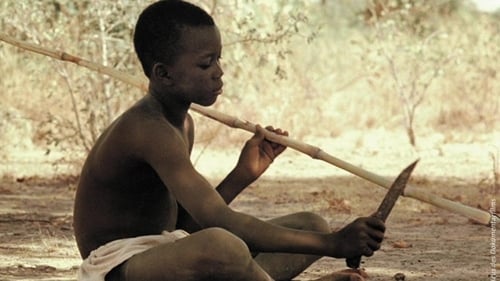Gaston Kaboré
Рождение : , Bobo Dioulasso, Upper Volta [now Burkina Faso]

Line Producer
In a quest to rediscover the spiritual values of his own people, an African filmmaker from the Gourmantche tribe of Burkina Faso visits an Aboriginal band, the Atikamekw of northern Quebec. The resulting documentary is a dialogue between those who divine the future in the sand with those who use snow-encased sweat lodges to reconnect with the spiritual world.

Writer
In an early 19th century African village, Wend Kuuni - a young man, lives with his adopted family after his mother was killed as a witch. When Pughneere - his adopted sister - becomes ill, the villagers suspect Wend Kuuni. In order to save Pughneere's life (and his own) he must set out on a journey to find a healer. His quest brings him in contact with people around him and is a journey of self-discovery.

Producer
In an early 19th century African village, Wend Kuuni - a young man, lives with his adopted family after his mother was killed as a witch. When Pughneere - his adopted sister - becomes ill, the villagers suspect Wend Kuuni. In order to save Pughneere's life (and his own) he must set out on a journey to find a healer. His quest brings him in contact with people around him and is a journey of self-discovery.

Director
In an early 19th century African village, Wend Kuuni - a young man, lives with his adopted family after his mother was killed as a witch. When Pughneere - his adopted sister - becomes ill, the villagers suspect Wend Kuuni. In order to save Pughneere's life (and his own) he must set out on a journey to find a healer. His quest brings him in contact with people around him and is a journey of self-discovery.

Director
В столетний юбилей кино стартовал проект «Люмьер и компания»: сорока режиссерам с мировыми именами предложили снять киноролики, используя камеру братьев Люмьер — ту самую, запечатлевшую прибытие поезда. Главное условие: киноролик должен длиться не более 50 секунд — времени демонстрации первого в мире фильма.

Writer
Кузнец падает с велосипеда когда он попытался избежать черепахи, пересекающую его путь. Он приносит животное домой к своему двенадцатилетнему сыну, Раби, который так им очарован, что забывает о своих делах в папином магазине. Когда сердитый кузнец убирает черепаху, дед Раби, Пусга, помогает ему найти такую же побольше, чтобы успокоить мальчика. Раби хочет приручить животное, и эта новая одержимость заставляет его бросить вызов родителям...

Director
Кузнец падает с велосипеда когда он попытался избежать черепахи, пересекающую его путь. Он приносит животное домой к своему двенадцатилетнему сыну, Раби, который так им очарован, что забывает о своих делах в папином магазине. Когда сердитый кузнец убирает черепаху, дед Раби, Пусга, помогает ему найти такую же побольше, чтобы успокоить мальчика. Раби хочет приручить животное, и эта новая одержимость заставляет его бросить вызов родителям...


Producer
In the Mossi culture, one of the rites attending the birth of a child and its induction as a new member of the community involves the burial of the placenta. The space in which the placenta is buried is called 'Zan Boko' - a phrase which connotes the religious, cultural and affective relations that bind the child to the land and that embraces the notions of 'rootedness' and 'belonging'. Kaboré tells the story of Tinga, who resists the encroaching urbanization of his native territory. The specific rhythms and vision of the rural community, including its values, social relationship, and individual & collective destinies, are altered when a city is planted on the edge of an ancient native village.

Writer
In the Mossi culture, one of the rites attending the birth of a child and its induction as a new member of the community involves the burial of the placenta. The space in which the placenta is buried is called 'Zan Boko' - a phrase which connotes the religious, cultural and affective relations that bind the child to the land and that embraces the notions of 'rootedness' and 'belonging'. Kaboré tells the story of Tinga, who resists the encroaching urbanization of his native territory. The specific rhythms and vision of the rural community, including its values, social relationship, and individual & collective destinies, are altered when a city is planted on the edge of an ancient native village.

Director
In the Mossi culture, one of the rites attending the birth of a child and its induction as a new member of the community involves the burial of the placenta. The space in which the placenta is buried is called 'Zan Boko' - a phrase which connotes the religious, cultural and affective relations that bind the child to the land and that embraces the notions of 'rootedness' and 'belonging'. Kaboré tells the story of Tinga, who resists the encroaching urbanization of his native territory. The specific rhythms and vision of the rural community, including its values, social relationship, and individual & collective destinies, are altered when a city is planted on the edge of an ancient native village.

Writer
В доколониальные времена торговец, пересекший саванну, обнаруживает лежащего без сознания в кустарнике ребенка. Когда мальчик приходит в себя, он не смог объяснить, кто он, так как нем. После обыска его родителей, семья торговца усыновляет его. Вскоре, Венд Кууни начнёт разговаривать после того, как стал свидетелем трагического события, которое побуждает его раскрыть свою историю.

Director
В доколониальные времена торговец, пересекший саванну, обнаруживает лежащего без сознания в кустарнике ребенка. Когда мальчик приходит в себя, он не смог объяснить, кто он, так как нем. После обыска его родителей, семья торговца усыновляет его. Вскоре, Венд Кууни начнёт разговаривать после того, как стал свидетелем трагического события, которое побуждает его раскрыть свою историю.











